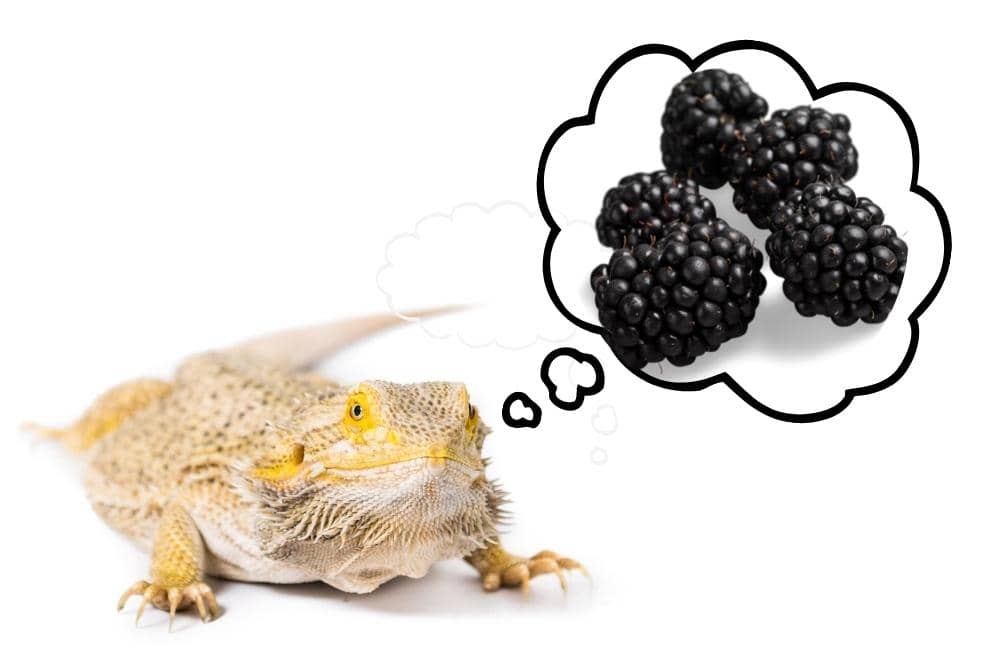Blackberries are one of the most delicious fruits we all love to eat, and you will hardly come across a person who doesn’t eat a bit of this delicious fruit. Naturally, as a bearded dragon fancier, you would love to share this tasty fruit with your bearded friend. But knowing that every fruit is not suitable for beardies, you may be confused about “Can Bearded Dragons Eat Blackberries?” “Are blackberries safe for the bearded dragon?” “How much and how often bearded dragons can eat blackberries?” etc. Let’s see how you can help your bearded friend to enjoy this delicious fruit.
Can Bearded Dragons Eat Blackberries?
YES, you can confidently offer your bearded friend blackberries, as blackberries are considered safe and healthy for bearded dragons. Blackberries are a delicious dessert that bearded dragons are eager to eat. Some people also sprinkle blackberries on top of greens to make greens more appealing and appetizing for beardies. Although this delicious purple fruit is healthy, rich in different nutrients, and considered safe for bearded dragons, there are certain limits we will discuss later.
Benefits Of Blackberries For Bearded Dragons
Don’t get deceived by the size of this tiny fruit. It is richly packed with nutrients, and only a handful of pieces can provide an impressive, nutritious pack for the bearded dragon. They are not just incredibly delicious; your bearded dragon will enjoy some fantastic wellness benefits when they consume blackberries. Let’s have a look at what nutrients and benefits blackberries can provide.
Water
Blackberries are high in water content, accounting for nearly 88% of their total weight. So offering blackberries from time to time is an excellent way to keep your bearded friend hydrated all the time. However, make sure to be moderate and don’t offer too many blackberries because too much water can cause abdominal disturbance and diarrhea (prolonged diarrhea can lead to dehydration).
Phosphorous & Calcium
Since calcium and phosphorus are required for healthy bone growth and different metabolic functions, the diet’s calcium to phosphorus ratio is crucial. Any diet that has more calcium than phosphorus is considered suitable for bearded dragons because phosphorus has a natural tendency to bind calcium. When phosphorus binds to calcium, it can’t be absorbed by the body from the intestine. So if a diet contains a 1 : 1 calcium to phosphorus ratio (or phosphorus is on the higher side), it will bind all the calcium. No calcium will be available to the body and body, which can lead to hypocalcemia (deficiency of calcium). Hypocalcemia will result in poor bone development or weaker bones.
Fortunately, the calcium to phosphorus ratio in the blackberries is 1.3 : 1, which means a lot of calcium is available for the bearded dragon’s body to be utilized. So feeding blackberries will ensure that your bearded dragon is getting a continuous supply of calcium to meet its body’s requirements.
Fiber
Fiber is another useful nutrient that is present in a reasonable amount in blackberries. All of us are familiar that fiber is beneficial for the proper functioning of the digestive system and digestion of food. Bearded dragon’s digestive system is no exception, and beardies also need fiber for the same reason. At the same time, too much fiber intake can cause intestinal disturbance, diarrhea, and other health issues. In addition, while offering blackberries to your bearded friend, it’s crucial to remember that fiber is also present in many other fruits and vegetables. So you must be careful not to offer him too much fiber.
Antioxidants
Blackberries are renowned for being rich in antioxidants, and this property makes them an ideal addition to the diet of bearded dragons. Antioxidant aid in reducing swelling or inflammation, fighting free radicals, and also has a lot of benefits for the cardiovascular system.
Vitamins
Blackberries are a good source of many vitamins; all vitamins are required for different metabolic functions, growth, and healthy organs and the body. However, blackberries are specifically rich in vitamin A (needed for good vision), vitamin C (which plays a crucial role in the development of a stronger immune system), and vitamin K (which especially helps in clotting and some other metabolic functions).
Minerals
In addition to calcium and phosphorus, blackberries are also rich in some other vital minerals, especially zinc and manganese. Both zinc and manganese play a crucial role in critical metabolic functions and keeping the immune system in good shape.
How Often Can You Offer Blackberries To Your Bearded Dragon?
As mentioned above, despite being amazingly delicious and rich in different nutrients, you should not feed too many blackberries to your bearded friend. This is due to blackberries’ higher fiber and water content because too much water or fiber intake can also harm your bearded friend. So, according to reptile experts, you should offer only a few pieces of blackberries once in 14 days.
Other Limiting Factors
Besides water and fiber, some other factors also require us to offer only a limited amount of blackberries to bearded dragons. Let’s have a brief look….
1. Since beaded dragons in captivity live in a limited space and don’t have enough opportunity for physical activities any diet having higher sugar contents is harmful to them. Unfortunately, blackberries contain lot of sugar. So offering too much blackberries can prone your bearded dragon to obesity, dental, joint, and cardiovascular issues.
2. Like all other berries, blackberries also contain Oxalates. Although, oxalates are beneficial for the overall health and wellbeing of beardies, higher levels of oxalates in the body will hinder calcium uptake from the intestine into the body, as a result body will suffer from a calcium deficiency.
Can My Bearded Dragons Eat Blackberry Leaves?
Yes, leaves of blackberry are safe for bearded dragons, and they can eat them. However, there is no need to offer blackberry to your beardie because the leaves have no or very little nutritional value, while their oxalate concentration can be on the higher side.
Can My Bearded Dragon Eat Wild Blackberries?
Technically speaking, there is no harm in offering wild blackberries to bearded dragons. However, wild blackberries may be exposed to pests, different worms, and many other unknown organisms. So the best way is to avoid wild blackberries, and if necessary, make sure to check for worms and wash them thoroughly before offering them to your bearded friend.

